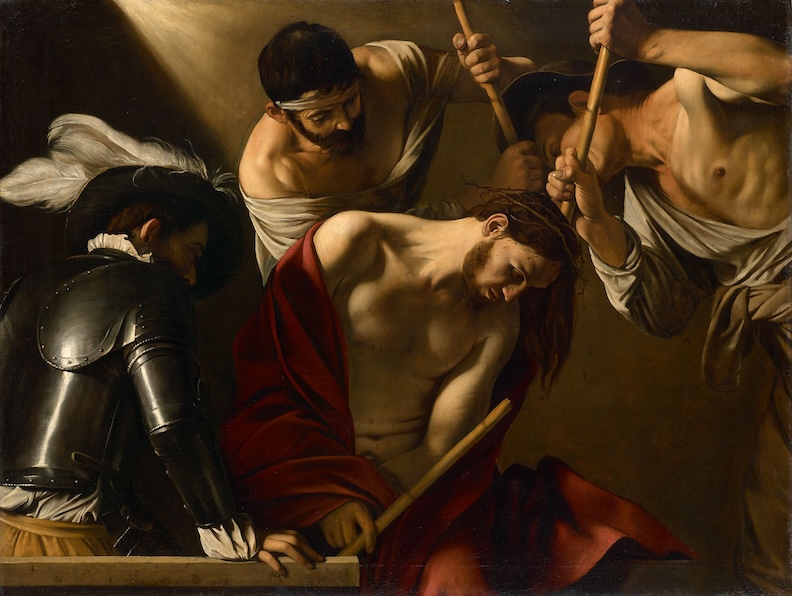On Thanksgiving we marked the anniversary of the martyrdom of Blessed Miguel Pro. On November 23, 1927, having been unjustly condemned, he was brought before the firing squad for execution. He was given a few moments to kneel in prayer. Then he stood, forgave his executioners, and spread his arms out in cruciform to await – and even welcome – his death. In the instant before the volley struck him down, he cried out, “Viva Cristo Rey!”
That cry – Viva Cristo Rey! – was popular among the persecuted Catholics in 1920s Mexico. It was the battle cry of the Cristeros, the freedom fighters who rose up against the government’s oppression. It came as a faithful response to the newly established feast of Christ the King, which we celebrate today. Unfortunately, we now make two mistakes about this feast.
First, we tend to confine it to the personal, to an interior reality or private devotion. Of course, there is something intensely personal about Christ the King. That’s the dreadful lesson of today’s Gospel: “you did it to me. . .you did it not to me.” As important as it is to donate to charities and give alms, in the end there’s no outsourcing the works of mercy. Each of us must respond personally to the poor, thirsty, hungry, naked, homeless, and imprisoned Christ in our midst. But the manifestation of reward and punishment indicated by today’s parable means that our personal devotion to Christ the King is ultimately public as well.
Second, we often see the significance of Christ the King as just an eschatological reality, something to come at the end of the world. (The moving of the feast from its original location to the end of the liturgical year contributes to this impression). And, yes, it’s also true that the reign of Christ will be fully realized only when he returns in glory. We hear as much in today’s Gospel. But that same Gospel also – and more importantly – teaches that his Kingdom is already present because Christ is already present in the poor. His Kingdom isn’t something we can delay.
All of which means that the reign of Christ the King must be not only personal and eventual but also public and present. It must be lived outwardly, because Christ is King of our entire – not just our private – lives. It must be lived now, because Christ the King is present in our midst. Indeed, to encourage such a public, present living out of the reign of Christ the King was the entire purpose of the feast.
Pius XI instituted this Solemnity in 1925 with the encyclical Quas Primas. It was an odd time to speak about kingship because many of the world’s monarchies were disappearing. Tsar, Kaiser, Emperor, and Sultan had all been swept away by World War I. Monarchies had given way to republics, kings to the people.

Pius XI spent much of his pontificate addressing this new geopolitical situation of a less monarchical, more self-styled “democratic,” world. He negotiated concordats with new (often unsavory) governments to secure room for the Church’s mission. But in the midst of it all, he called attention not to democracy or monarchy, but to Christ the King.
What concerned Pius XI was not necessarily the new forms of government but the radical secularization of states and societies. God had been exiled from the public square. The only valid considerations were human rights, ingenuity, and power. The rights, truth, and grace of God were not only ignored but often forbidden. There was a new absolutism of man over God that would quickly lead, as the pope intuited, to man’s inhumanity to man.
Of course, we face the same phenomenon today, the attempt to build a just society without the Just One. God and his believers are not welcome in the public square. Separation of church and state is interpreted by many to mean that you must separate yourself from your faith if you want a role in public life. The only Catholics celebrated in politics are those who are go against their own Church’s teachings on the right to life and marriage, who are willing to acknowledge Christ as King privately, but not publicly.
To counter this, Pius XI called attention to the public and present reign of Christ the King. Christ’s truth and rights cannot be confined to private devotion or delayed until his second coming. They must be acknowledged now. The peace that we seek in all our policy debates, culture wars, and social conflicts can only come to us in the Kingdom of Christ. Pax Christi in Regno Christi was Pius XI’s motto: The Peace of Christ in the Kingdom of Christ. The reign of Christ is not opposed to human flourishing but the necessary condition for it. Or, as Benedict XVI would teach years later, “Whoever defends God is defending man.”
Quas Primas is in many ways a social encyclical. It addresses at length the proper ordering of society. But it also instituted a feast, an annual celebration to weave the truth of Christ the King into the fabric of the faithful’s lives. The greatest service we can provide society is to cultivate a public devotion to the presence of Christ the King. We miss the point of this feast entirely if we do otherwise.
Viva Cristo Rey! Not just interiorly, but publicly. Viva Cristo Rey! Not eventually, but now.
















